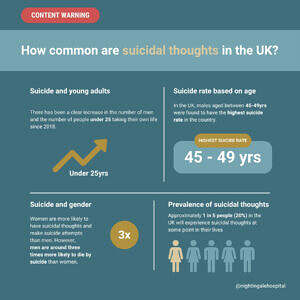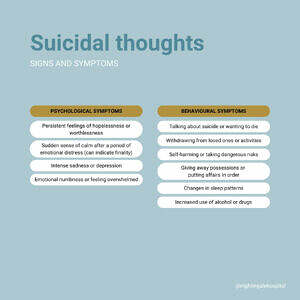Suicidal thoughts: What is it, causes, prevalence, signs, risk factors, managing and treatment
Content Warning
This page discusses suicidal thoughts and behaviours, which some readers may find distressing. If you’re feeling vulnerable, you might not want to read the information below. There are details of where to find help at the bottom of this page.
If you are in crisis or need immediate support, please contact emergency services or go to your nearest A&E.
What are suicidal thoughts?
Suicidal thoughts, also known as suicidal ideation, refer to thinking about, wishing for, or planning to take one’s own life. These thoughts can range from fleeting feelings of despair to detailed planning of suicide.
Many people experiencing suicidal thoughts feel like a burden to those around them or believe the world would be better off without them. While these thoughts can feel all-consuming, it is important to understand that they are not facts—and help is available.
If you are experiencing suicidal thoughts, you might feel frightened, confused, or ashamed. These feelings are more common than you may think, and you are not alone. With the right support and treatment, things can get better.
If you are in immediate danger or struggling to stay safe, please seek urgent help by visiting your nearest A&E or calling emergency services.
Get support for suicidal thoughts
We understand that reaching out to someone you don’t know about what you’re experiencing can be a big step. Our team is here to offer a confidential conversation to discuss your concerns and how we can support you, through assessment and treatment. Complete the enquiry form below and our team will be in contact with you.
Causes of suicidal thoughts
Suicidal thoughts can affect anyone, regardless of age, gender, background, or circumstances. There is rarely one single cause. Often, suicidal thoughts develop when multiple stressors or mental health challenges build up and feel impossible to manage.
Some common contributing factors include:
- Major life changes (e.g., retirement, redundancy)
- Bullying or abuse (at home, work, or school)
- Bereavement or other forms of loss
- Long-term illness or chronic pain
- Financial worries or unemployment
- Relationship breakdowns
- Mental health conditions (e.g., depression, bipolar disorder, psychosis, schizophrenia, personality disorders)
- Discrimination or cultural pressure
- Identity struggles (e.g., related to sexuality or gender)
- Loneliness or social isolation
- Postnatal depression or distress during/after pregnancy
It’s important to know that you don’t have to fully understand why you feel this way to seek help.
If you are struggling with suicidal thoughts, please know that you are not alone, and support is available.
Getting the right help can make a real difference in understanding and addressing the underlying causes.
If you are in crisis or feel unsafe, please go to your nearest A&E department or contact local emergency services for immediate support.
How common are suicidal thoughts?
- Approximately 1 in 5 people (20%) in the UK will experience suicidal thoughts at some point in their lives.1
- Women are more likely to have suicidal thoughts and make suicide attempts than men. However, men are around three times more likely to die by suicide than women.2
- In the UK, males aged 45-49 years were found to have the highest suicide rate.3
- There has been a clear increase in the number of men and the number of people under 25 taking their own life since 2018.4
- 1 in 8 LGBTIQ+ people aged 18 to 24 have attempted to end their life.5
- It is common to experience suicidal thoughts in conjunction with certain mental health problems, such as depression, bipolar, psychosis, schizophrenia or personality disorders.6

Signs of suicidal thoughts
The reasons that people take their own lives are often very complex. It’s important to remember that it’s not always possible to recognise the signs of suicidal thoughts in real time. Some people may hide their feelings or appear to be coping on the surface, even while struggling deeply inside.
When someone is contemplating suicide, sometimes their words and actions can give you clues that they are at risk for hurting themselves. Recognising the signs in yourself or someone else can be lifesaving. Warning signs may include:
Psychological symptoms:
- Persistent feelings of hopelessness or worthlessness
- Intense sadness or depression
- Emotional numbness or feeling overwhelmed
- Sudden sense of calm after a period of emotional distress (can indicate finality)
Behavioural signs:
- Talking about suicide or wanting to die
- Withdrawing from loved ones or activities
- Self-harming or taking dangerous risks
- Giving away possessions or putting affairs in order
- Changes in sleep patterns
- Increased use of alcohol or drugs
If you notice these signs in yourself or someone else, it is essential to seek help. You are not alone, and support is available.

How to manage/stop suicidal thoughts?
Suicidal thoughts can feel frightening and intense, but they are temporary, and with support, they will pass. Here are steps that may help you manage these thoughts in the moment:
- Talk to someone you trust: Opening up to a friend, family member, or professional can reduce the sense of isolation.
- Recognise that thoughts are not actions: You don’t have to act on suicidal thoughts; they are a symptom of distress, not a reflection of who you are.
- Focus on just the next hour: Don’t try to solve everything at once. Take it minute by minute if you need to.
- Create a safer environment: Remove or avoid things you might use to harm yourself.
- Distract yourself: Try activities that engage your mind, even briefly, watch a film, take a walk, write, listen to music.
- Avoid alcohol or recreational drugs: These can intensify distress and reduce your ability to stay safe.
- Reach out for support: Speak to a GP, therapist, or helpline. Do not wait until it feels unbearable.
For continued care and support, consider speaking with a mental health professional to explore the root causes of these feelings and begin your healing journey.
Treatment for suicidal thoughts
We understand that sharing how you are feeling and reaching out for professional help can feel incredibly overwhelming. But taking that first step is a powerful act of courage – the journey towards a rewarding life, one filled with love, hope, and possibility. Treatment for suicidal ideation is typically multi-layered and may include a combination of the following:
Comprehensive Assessment and Safety Planning
The first step in treatment is a full assessment by a mental health professional. This helps identify the severity of the suicidal thoughts, any underlying conditions (such as depression or anxiety), and any immediate risks.
- A personalised safety plan may be developed to help you stay safe during periods of crisis. This often includes identifying warning signs, coping strategies, and who to contact for support.
Psychological Therapies
Therapy is a cornerstone of treatment. Evidence-based talking therapies can help you explore what’s contributing to your distress and teach practical skills to manage it.
- Cognitive Behavioural Therapy (CBT) – A structured, short-term therapy that helps challenge negative thinking patterns and develop healthier coping mechanisms.
- Dialectical Behaviour Therapy (DBT) – Particularly helpful for people who experience intense emotions or self-harm. DBT teaches skills for emotional regulation, distress tolerance, and interpersonal effectiveness.
- Psychodynamic or trauma-focused therapies – May be recommended if suicidal thoughts are linked to past experiences, unresolved trauma, or long-standing emotional patterns.
Medication
Medication may be prescribed to treat underlying mental health issues such as depression, bipolar disorder, or anxiety, which can contribute to suicidal thinking.
- Antidepressants, mood stabilisers, or antipsychotic medications may be used, depending on individual needs.
- Medication is usually most effective when combined with therapy and regular monitoring by a prescribing clinician.
Crisis Services and Hospital Treatment
In situations where suicidal risk is high, more intensive support may be necessary:
- Crisis teams can provide urgent home-based support.
- Hospital admission may be recommended if there is a serious risk of harm and you need a safe environment for stabilisation and treatment.
Social and Lifestyle Support
It is important to address the social and practical factors that can contribute to suicidal thoughts:
- Support with housing, employment, or finances
- Peer support groups
- Lifestyle changes such as improving sleep, nutrition, physical activity, and social connection
Why seek professional support for suicidal thoughts?
Recovery is possible. Treatment is not one-size-fits-all; what works best will depend on your unique experience. Working with a mental health team can help you understand the root causes of your distress, build resilience, and rediscover meaning and hope in your life.
Nightingale Hospital’s approach to treating suicidal thoughts and accompanying mental health problems combines individualised programmes with treatments based on current clinical evidence. You can seek support through outpatient, day patient or inpatient care settings.
If you’re feeling suicidal, know that these thoughts don’t define you. Many people who have felt the way you do now have found relief and purpose again through support, treatment, and time.
Remember, you are not alone—and you don’t have to face this on your own. Help is available.
Discovering someone you care about is experiencing suicidal thoughts can be an emotional and overwhelming experience. It is natural to feel scared, confused, or even helpless.
However, your understanding and support can make a significant difference in their journey toward healing.
Useful resources
If you’re finding things difficult, you’re not alone—there are people who care and want to help. Below are some confidential support services available to you:
-
Samaritans: Call 116 123 or email jo@samaritans.org for free, confidential support 24/7.
- CALM: Call 0800 58 58 58 or chat on WhatsApp.
-
MIND: Call 0300 123 3393 or text 86463 for mental health support, available weekdays from 9am to 6pm.
-
Shout: Text “SHOUT” to 85258 for 24/7 support via text.
-
HOPELINE247 (Papyrus): If you’re under 35 and struggling with thoughts of self-harm or suicide, call 0800 068 4141, text 88247, or email pat@papyrus-uk.org for free, confidential support 24/7.
-
Childline: If you’re under 19, call 0800 1111 for free, confidential support from trained counsellors.
- Switchboard: Call 0800 0119 100 or email hello@switchboard.lgbt – confidential and inclusive helpline offering support specifically for LGBTQIA+ people.
-
NHS: Visit the NHS website for advice, coping strategies, and support resources related to self-harm.








